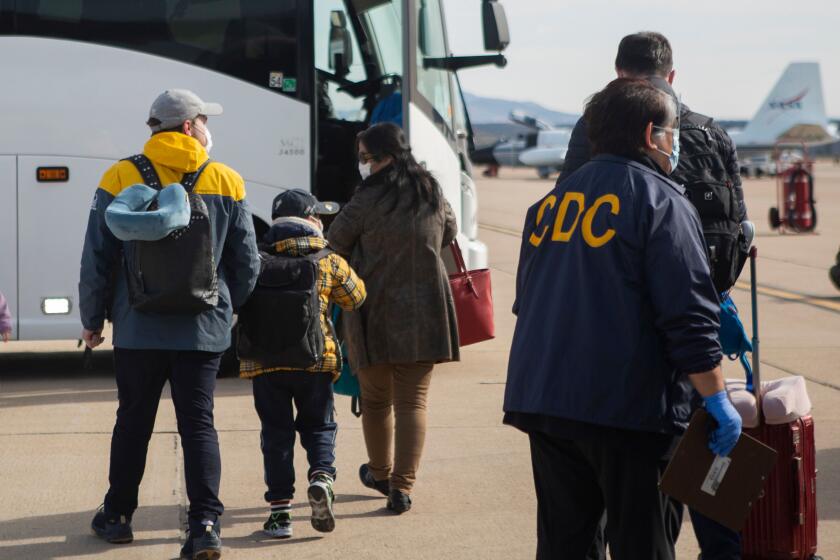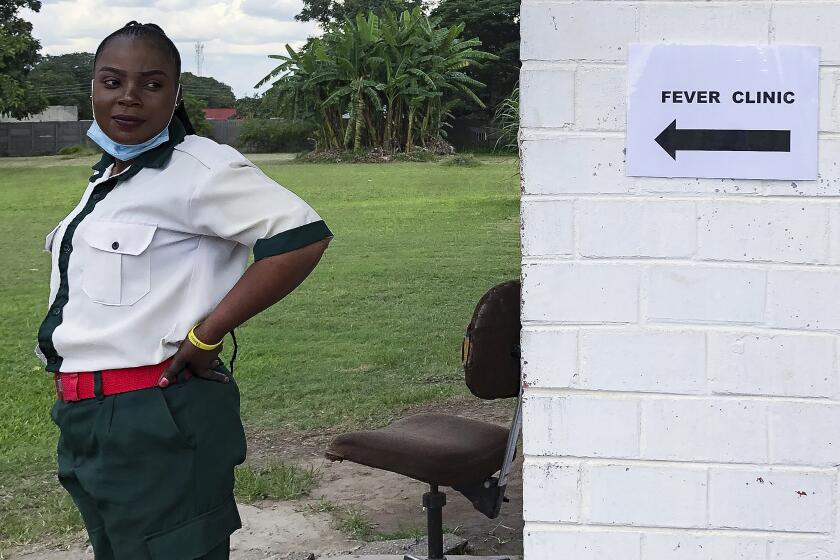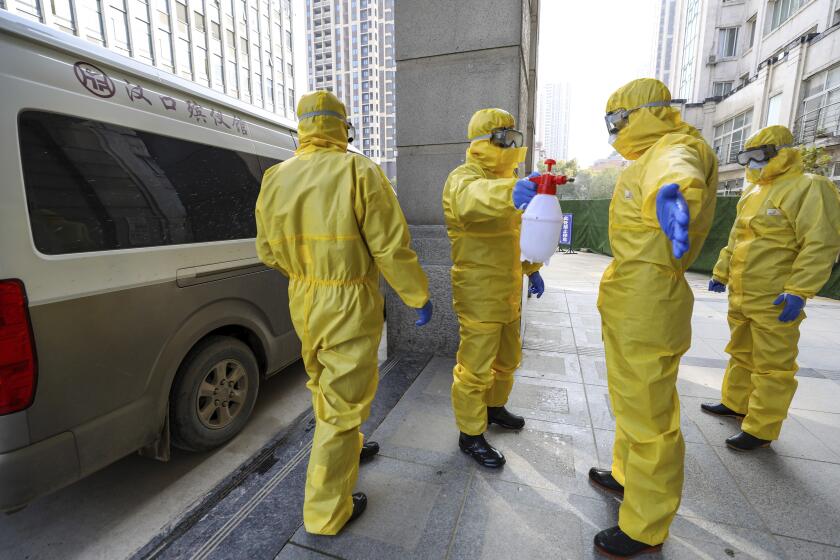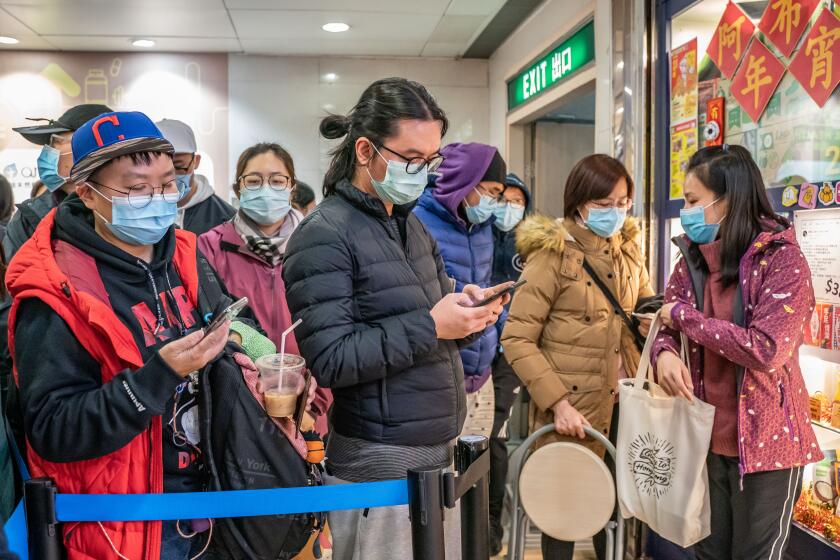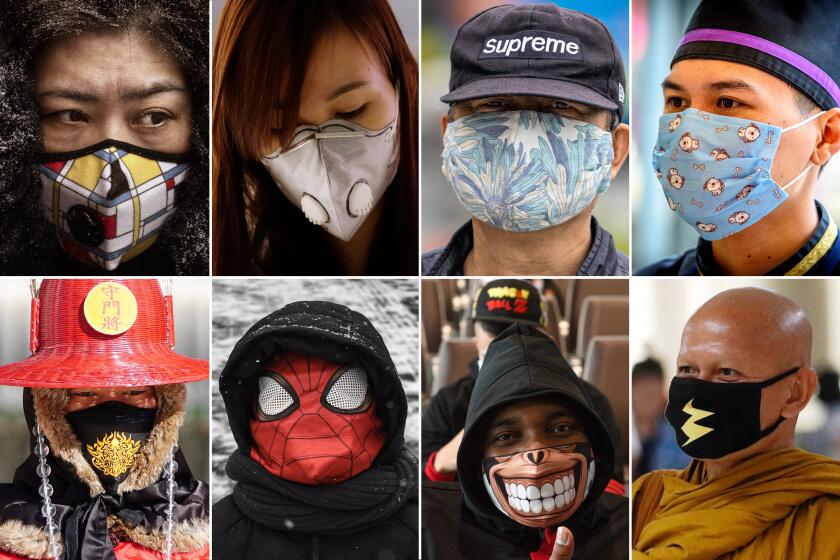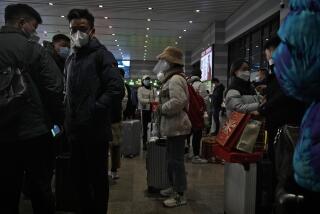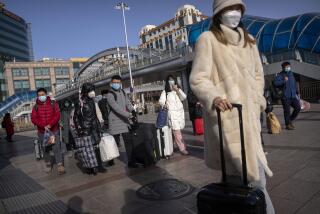Coronavirus death toll surpasses SARS but new cases fall

China’s coronavirus death toll rose by 89 on Sunday to 811, passing the number of fatalities in the 2002-03 SARS epidemic, but fewer new cases were reported in a possible sign its spread may be slowing as other nations stepped up efforts to block the disease.
Some 2,656 new virus cases were reported in the 24 hours ending at midnight Saturday, most of them in the central province of Hubei, where the first patients fell sick in December. That was down by about 20% from the 3,399 new cases reported in the previous 24-hour period.
“That means the joint control mechanism of different regions and the strict prevention and control measures have worked,” a spokesman for the National Health Commission, Mi Feng, said at a news conference.
Also Sunday, new cases were reported in Japan, South Korea, Vietnam, Malaysia and Spain.
More than 360 cases have been confirmed outside mainland China.
Why did the U.S. government imposed a quarantine now for coronavirus, when no such mandate has been issued in over 50 years, despite routine outbreak of disease?
“Dramatic reductions” in the spread should begin this month if containment works, said Dr. Ian Lipkin, director of Columbia University’s Center for Infection and Immunity. He assisted the World Health Organization and Chinese authorities during the outbreak of SARS, or severe acute respiratory syndrome.
Warmer weather will reduce the coronavirus’ ability to spread and bring people out of enclosed spaces where it is transmitted more easily, Lipkin said in an online news conference. However, he said, if new cases spike as people return to work after the Lunar New Year holiday, which was extended to reduce the risk of spreading the virus, then “we’ll know we’re in trouble.”
The fatality toll passed the 774 people believed to have died of SARS, another viral outbreak that originated in China. The total of 37,198 confirmed cases of the new strain of the virus vastly exceeds the 8,098 sickened by SARS.
After a trip from Wuhan, China, lasting 37 hours, 167 evacuees are living at the Marine Corps Air Station Miramar in San Diego County.
The latest developments:
New cases in several countries
Japan reported six more cases among 3,700 passengers and crew aboard the quarantined cruise ship Diamond Princess, bringing the number of infections on the vessel to 70. The new cases are an American passenger in her 70s and five crew members — four Filipinos and a Ukrainian.
South Korea reported a new case in a 73-year-old woman whose relatives visited Guangdong province in southern China, raising its total to 27. The Korea Centers for Disease Control and Prevention said the family members, a 51-year-old South Korean man and a 37-year-old Chinese woman, were confirmed infected later Sunday.
Vietnam reported its 14th case. The Health Ministry said she is a 55-year-old woman in Vinh Phuc province, northwest of Hanoi, where six earlier patients were found to be infected.
Malaysia reported its 17th case. The 65-year-old woman’s son-in-law was diagnosed earlier with the virus.
Spain confirmed its second case in Mallorca, a popular vacation island in the Mediterranean. The first case was a German tourist diagnosed a week ago in the Canary Islands off northwest Africa.
The new virus that has spread across China has yet to be confirmed in Africa, but some health workers on the ground warn they are not ready to handle an outbreak.
Hong Kong releases quarantined cruise ship
The 1,800 passengers and 1,800 crew members of the cruise ship Dream World were released from quarantine after Hong Kong authorities said tests of the crew found no infections.
The ship was isolated after eight mainland Chinese passengers were diagnosed with the disease last month.
Port official Leung Yiu-hon said some passengers with symptoms tested negative but there was no need to test all of them because they had no contact with the infected Chinese passengers.
Meanwhile, Hong Kong began enforcing a 14-day quarantine for arrivals from mainland China. The territory’s chief executive, Carrie Lam, has refused demands by some hospital workers and others to seal the border completely.
Amid coronavirus outbreak, Chinese people are angered by state propaganda and demanding accountability and truth.
Wuhan opens hospital, farmers to get support
A 1,500-bed hospital built in two weeks in Wuhan, the city at the center of the outbreak, accepted its first patients on Saturday, the government announced. An additional 1,000-bed hospital built in 10 days opened last week.
The government of the city of 11 million people said it would begin carrying out twice-daily disinfection of hospitals, markets, public toilets and other facilities starting Sunday.
The government of the surrounding province of Hubei will pay subsidies to farmers, other food producers and supermarkets and give tax breaks to companies that donate to anti-virus work, the official Xinhua news agency said. It said the government will subsidize overtime for employees of companies making medical supplies.
China’s leaders are trying to keep food flowing to crowded cities despite anti-disease controls and to quell fears of possible shortages and price spikes following panic buying after most access to Wuhan and nearby cities was cut off.
With so much false information circulating about the coronavirus outbreak, health officials are trying to set the record straight. Here’s why that can backfire.
Two more flights from Wuhan carrying American citizens, permanent residents and close relatives landed in the United States, the State Department said. A spokesman said more than 800 Americans have been evacuated from Wuhan.
A plane evacuating more than 200 people from Wuhan landed Sunday in Britain. British officials said the flight, the country’s second evacuation plane, brought back 105 British citizens and family members, as well as 95 European citizens and family members. The passengers will be quarantined at a hotel for 14 days.
Dozens of repatriated Brazilians, some waving small Brazilian flags, landed Sunday morning at an airbase in the state of Goias, where they will spend the next 18 days in quarantine.
A charter flight carrying Filipinos from Wuhan arrived in the Philippines. The 29 adults and one infant will be quarantined for 14 days. At least 56 Filipinos initially planned to join the flight home, but some changed their mind and others feared they couldn’t immediately return to their jobs and lives in Hubei because of travel restrictions, officials said.
Elsewhere in China, the industrial metropolis of Chongqing in the southwest told residential communities to close their gates and check visitors for fever. The government said the spread of the virus through “family gatherings” had been reported in Chongqing but gave no details.
Despite the colossal efforts to contain the new coronavirus, scientists are quietly preparing for an increasingly likely outcome: A full-blown global pandemic.
France, Italy take precautions
France closed two schools and tried to reassure vacationers in the Alps after five Britons contracted the virus at a ski resort.
France stepped up a travel alert, recommending against all visits to China except for “imperative reasons.”
Italy recommended students returning from China stay home from school for two weeks after the government reported three cases.
With face masks nearly impossible to find in Asia stores, people share creative alternatives on social media: a mask made of a maxi pad? Half an orange?
WHO sending experts
The World Health Organization director-general said it will send experts to China starting Monday or Tuesday.
Asked whether that will include members of the U.S. Centers for Disease Control and Prevention, Tedros Adhanom Ghebreyesus replied, “We hope so.”
More to Read
Start your day right
Sign up for Essential California for news, features and recommendations from the L.A. Times and beyond in your inbox six days a week.
You may occasionally receive promotional content from the Los Angeles Times.

